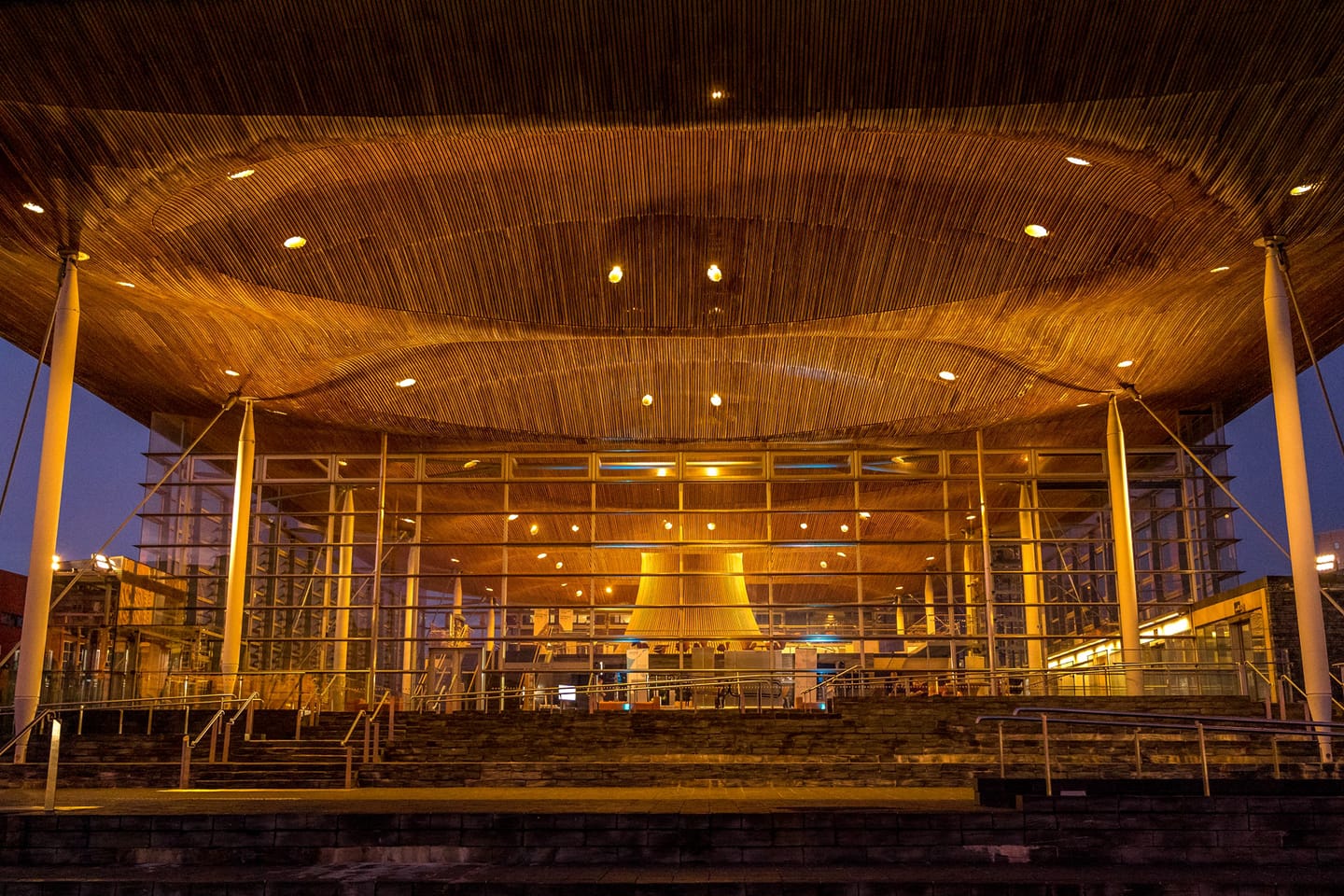News
Labour and Plaid unveil a deal for Government

ON MONDAY (November 22), Labour and Plaid Cymru announced an agreement to stitch up the Senedd for the next three years.
Amid much self-congratulation, Adam Price and Mark Drakeford hailed their success at reaching an agreement.
Labour promises to deliver the bits of its Manifesto with which Plaid agrees and considers delivering the bits of Plaid’s Manifesto that it finds unobjectionable.
WHAT THEY SAY
A joint press release says: “The agreement is a joint policy programme covering 46 areas, ranging from the delivery of free school meals to all primary school pupils; a commitment to take immediate and radical action to address the second homes crisis, to long-term reform of the Senedd.
“This is a new form of political working arrangement. The two partners – the Welsh Government and the Plaid Cymru Senedd Group – will work together to jointly develop and oversee the delivery of the policies covered by the agreement over the coming three years.”
First Minister Mark Drakeford said: “The Welsh Government has an ambitious Programme for Government, which it will deliver over this Senedd term. But we do not have a monopoly on good ideas, and we will work with progressive parties where we have shared and common interests to benefit people in Wales.
“This Co-operation Agreement brings the Welsh Government and Plaid Cymru together to respond to some of the most pressing issues facing Wales today, such as climate change and the energy and cost-of-living crisis.
“We can achieve more for people in Wales by working together, and the Co-operation Agreement is both a response to the external challenges we face and a chance to build on the opportunities in our future. It will also help us secure a stable Senedd over the next three years, capable of delivering radical change and reform.
“These commitments build on our shared values of social solidarity, a sustainable planet and a vibrant democracy.”
Adam Price, Leader of Plaid Cymru, said: “Almost a quarter of a century ago, people in Wales voted for self-government for Wales, with a promise of a new type of politics.
“They placed their trust in a new democracy with an instruction to work differently – inclusively and co-operatively.
“The challenges we face require real ambition to deliver radical ideas. The fallout from leaving the European Union, the legacy of the pandemic, and the UK Government’s determination to erode the Senedd’s powers all increase the need for transformational change.
“Taken together, the bold policy pledges will unite Wales and benefit every generation, from all primary school pupils receiving free school meals to a national care service, free at the point of need.
“I am pleased this pioneering Co-operation Agreement is founded on common ground on a range of issues that will make a long-lasting difference to people’s lives.”
As part of the agreement, a publicly owned energy company for Wales could be created to encourage community-owned renewable energy generation; there will be further investment in flood defences and new measures to strengthen the Welsh language and support for young people’s mental health.
This is a bespoke agreement – it is not a coalition; Plaid Cymru Members will not be joining the Welsh Government as Ministers or Deputy Ministers. Plaid Cymru will appoint a designated lead member for the agreement. Committees of Welsh Ministers and Plaid Cymru designated members will be established to agree on issues covered by the Co-operation Agreement.
Funding has been put in place as part of the Co-operation Agreement and reflected in the draft Budget published in December.
All issues outside the Co-operation Agreement will be handled in the normal course of political engagement.
THE FALL OF ADAM:
FROM HIGH IDEALS TO BASE REALITY
Before May’s election, Adam Price spoke about his “despair” at the prospect of five more years of Labour Government, of Labour’s failures in Wales, and how Wales deserved better.
It turns out what he meant was that he was happy to support Labour in exchange for many things Labour said it was going to do anyway.
The prospect of last week’s Welsh Food Bill (supported by Plaid) ever hitting the statute book has taken a massive step backwards. Instead, there’s likely to be a continuation of the current Welsh Government strategy of discussing whether to consult before talks about holding talks.
Labour hailed its thirty seats in May’s election as a massive endorsement for its policies. Voters rejected those policies in large parts of Wales, where the fight for seats was between Plaid and the Conservatives.
Bolting strong anti-Labour sentiment in traditionally Plaid supporting areas did not end well for Plaid after the One Wales Government.
It is hard to see the crustier members of the Party of Wales reconciling themselves to backing Labour in a Senedd many of them regard as not speaking for their concerns about language, culture, and rural Wales.
Setting unionism aside, the divide between rural Plaid voters and the Conservatives is a lot narrower than Plaid in Cardiff Bay would like to accept.
However, the signs that the parties would reach an agreement have been obvious for some time, notably at First Minister’s Questions.
Over recent weeks, Adam Price’s questions to Mark Drakeford played out like a charade.
The Plaid leader repeatedly invites the Labour leader to comment about the awfulness of the Westminster Government, and the Labour leader obliges and agrees with Mr Price about how awful it is.
The searching scrutiny of the Welsh Government’s actions one might expect from the Plaid leader has been from Mr Price’s questions.
All of which suggests both he and Mark Drakeford are more concerned about what Westminster is or isn’t doing than what the party in power in Wales is or isn’t doing.
It’s all been rather like the occasion when Margaret Thatcher, faced with short-term political difficulty, was asked by Pembrokeshire’s former MP Nicholas Bennett to list her Government’s achievements.
As someone who prides himself on his command of language and speech-making, Mr Price seems to have reconciled himself to the idea that it’s better to reign in Hell than serve in Heaven.
When it comes to political idealism against political reality, Mr Price has shown himself a pragmatist.
REAL-WORLD CONSIDERATIONS
With 45 Senedd members, Labour plus Plaid, the numbers stack up arithmetically to increase the number of MSs and change the electoral system.
The losers in such a change, Plaid and Labour calculate, will be the Conservatives.
Increasing the number of Senedd members has long been a Labour goal. In the last Senned term, Labour lacked the numbers to make the change: now it does.
An increase in the number of Senedd members works only if a larger Senedd gets things done and gets them done faster and better.
Labour’s record on introducing primary legislation to the Senedd is weak. For example, it is still wrangling over the scope of the Wellbeing of Future Generations Act passed in 2015, two Senedd elections ago.
There is, however, an issue that might cut through any proposed enlargement: public opinion.
Plaid’s and Labour’s recent rhetoric could come back to haunt them.
For the last two years, the Labour Government has lamented the powers being stripped away from it by the Conservative Government in Westminster.
Adam Price has agreed that the Conservatives have stolen powers and breached promises over finance at every turn.
If, as Labour and Plaid claim, the beastly Westminster Parliament is stealing away its power to do anything, the question arises as to why – with fewer effective powers at its disposal – Wales needs more Senedd Members.
A larger Senedd will not hinder a Conservative majority government in London from doing what it wants, and it would be neither more nor less legitimate than the current arrangement.
The result of sixty out of eighty Senedd members complaining when nobody’s listening will be no different than forty-five out of sixty.
CONSERVATIVES EMPHASISE
EVERYDAY PRIORITIES
A larger Senedd will not mean more powers in Cardiff unless Westminster grants them.
A larger Senedd must mean smaller (and possibly fewer) County Councils.
A larger Senedd might also mean a more openly centralised approach to Wales’s shambolic and chaotic health and social care provision.
The powers the agreement allows the Welsh Government to use are ones it already has – ones a Conservative Government granted it.
Wisely, the Welsh Conservative response to the deal does not over-egg the constitutional pudding.
It emphasises priorities for the Government over the party’s too-frequent claims of ‘constitutional chaos’.
A spokesperson said: “This deal fails to deliver on the priorities of the people of Wales.
“It does nothing to address the crisis in our NHS; nothing to improve our ailing Welsh infrastructure; and nothing to fire up our sluggish economy.
“Prioritising more politicians and constitutional reform over action to secure treatment for the one in five on an NHS waiting list or improving take-home pay for the low paid is appalling.
“Yet again, Plaid has betrayed its voters with another deal that cements a failing Labour administration into power for years to come.
“The message to voters is clear; vote Plaid, get Labour, and vote Labour, get Plaid. Only the Welsh Conservatives can deliver the real change that Wales needs.”
Crime
Man charged with attempted murder after Carmarthen park incident

57-year-old due in court following alleged knife and stalking offences
A MAN has been charged with attempted murder following a serious incident in Carmarthen town centre last week.
Dyfed-Powys Police confirmed that James McKenna, aged 57, from Carmarthen, has been charged with attempted murder, possession of a bladed article in a public place, and stalking.
The charges relate to an incident in Carmarthen Park on Thursday (Jan 29), which prompted a significant emergency services response and caused concern among residents.
Police have not yet released full details of the circumstances, but officers were seen in and around the park area for several hours following the incident while enquiries were carried out.
McKenna is due to appear before Llanelli Magistrates Court on Thursday (Feb 5).
The Herald understands the case involves allegations of both violence and targeted behaviour towards an individual, with stalking listed among the charges.
Public concern
Carmarthen Park is a popular and busy public space used daily by families, dog walkers and joggers, and incidents of this severity are rare.
The news has prompted concern locally, particularly as the alleged offences include possession of a knife in a public place.
Residents have previously raised questions about safety in parks and open spaces across west Wales, especially during darker winter evenings.
Court proceedings
At this stage, the charges remain allegations and the case will now proceed through the courts.
Magistrates will decide whether the case is sent to Crown Court due to the seriousness of the attempted murder charge.
Further details are expected to emerge during Thursday’s hearing.
The Herald will be attending court and will provide updates as they become available.
Crime
Sex offender jailed after living off grid in Pembrokeshire and refusing to register

Man walked into police station after months avoiding authorities
A CONVICTED sex offender who told police he intended to live “off grid” rather than comply with legal monitoring rules has been jailed after handing himself in at a Pembrokeshire police station.

Christopher Spelman, aged 66, of no fixed address, appeared for sentence at Swansea Crown Court after admitting breaching the notification requirements of the sex offenders register.
The court heard Spelman was released from prison in Dorset on July 4 last year but immediately refused to provide police with an address, despite being legally required to do so within three days.
Instead, he indicated he planned to buy a tent and live outdoors.
Prosecutor Brian Simpson said officers subsequently launched a nationwide search when Spelman failed to make contact with police. Public appeals were issued and his case featured on the television programme Crimewatch.
Detectives believed he had been travelling around the UK using public transport and staying at campsites. He was known to have links to several areas including Merseyside, Manchester, Devon, Cornwall and Hampshire.
His whereabouts remained unknown until January 3 this year, when he walked into Haverfordwest police station and was arrested. It is unclear how long he had been in Pembrokeshire.
Spelman previously served seven years in prison after being convicted in 2014 of 12 counts of sexually assaulting a girl under the age of 14. He was placed on the sex offenders register for life.
The court heard this was not the first time he had failed to comply with the rules. After an earlier release in 2016, he again failed to register his address and avoided police for around five years before being caught.
He has 11 previous convictions for 29 offences.
Defence barrister Andrew Evans described the case as unusual and said his client had long disputed his original conviction and had expressed a wish to live “outside society”.
However, he said Spelman had gradually accepted that he remained subject to court orders and now wanted more stable accommodation and a chance to rebuild his life. The defendant asked the court to impose a custodial sentence so arrangements could be made for his future release.
Judge Geraint Walters noted there were signs Spelman wished to change but warned that any further breaches would result in longer prison terms.
With credit for his guilty plea, Spelman was sentenced to 10 months in prison. He will serve up to half in custody before being released on licence.
Crime
Former Wales rugby star admits Christmas Day drink-driving offence

Ex-Ospreys captain was almost twice over limit in Pembroke town centre
Former Wales back row Jonathan Thomas has admitted driving through Pembroke town centre on Christmas Day when he was almost twice over the drink-drive limit.
This week Haverfordwest magistrates heard that Thomas, 43, was stopped by officers as he drove his Mercedes CLA 220 along The Green, Pembroke, at around 5pm on Christmas Day.
“The officers were very concerned at the manner of his driving, as the car was being driven erratically and was swerving to the other side of the road,” said Crown Prosecutor Sian Vaughan.
“When Jonathan Thomas got out of the car, the officers could see that he was having difficulty standing and was unsteady on his feet.”
Subsequent breathalyser tests showed Thomas had 62 mcg of alcohol in his system, the legal limit being 35.
Thomas, who has no previous convictions, pleaded guilty to the drink-drive charge and was represented in court by solicitor Jess Hill.
“He has family in the area and had travelled to spend time with them on Christmas Day,” she told the magistrates. “He’s very remorseful for his actions and hugely regrets his decision that day.”
Jess Hill concluded by saying that Thomas is currently “between jobs and living off his savings”.
Thomas, who gave his address as Main Road, Bredon, was disqualified from driving for a total of 18 months.
“The length of your disqualification reflects the fact that you were more than a little bit over the limit,” commented the presiding magistrates when imposing sentence.
He was fined £120 and ordered to pay £85 costs and a £48 court surcharge.
The former Wales back row left his role as Swansea RFC head coach at the beginning of December 2025 as a result of ongoing health concerns. He was forced to retire from playing in 2015 on medical advice after being diagnosed with epilepsy and is one of the 390 former rugby union players currently taking part in a concussion lawsuit against the sport’s authorities.
“Long-standing issues linked to the head trauma have caused me some concern recently and it has been impossible for me to give the role everything it needs,” he said in a previous interview with the BBC.
His rugby career started out with Pembroke RFC juniors before moving to Swansea RFC, which he captained when he was 19. He then joined the Ospreys where, over a ten-year period, he won four league titles and an Anglo-Welsh Cup. He was the youngest player to captain the Ospreys and, at the time of leaving, was the joint highest appearance holder, together with Andrew Bishop, on 188 appearances.
His international career saw him play for Wales at Under-16, Youth, Under-19, Under-21 and Sevens levels. He made his senior international debut against Australia in 2003, featured at the 2007 Rugby World Cup and was part of two Six Nations Grand Slam-winning sides in 2005 and 2008. Between 2004 and 2011, Thomas was included in every Wales Six Nations squad. In his appearances for Wales, he scored seven tries.
-

 Health6 days ago
Health6 days agoConsultation reveals lack of public trust in health board
-

 News1 day ago
News1 day agoPrincess of Wales visits historic Pembrokeshire woollen mill
-

 Crime5 days ago
Crime5 days agoPembroke man accused of child sex offences sent to Swansea Crown Court
-

 Community7 days ago
Community7 days agoCampaign to ‘save’ River Cleddau hits over 2,200 signatures
-

 Health3 days ago
Health3 days agoDoctor struck off after sexual misconduct findings at Withybush Hospital
-

 Community5 days ago
Community5 days ago50s women threaten legal action over pension compensation refusal
-

 Crime1 day ago
Crime1 day agoHakin man’s appeal delayed again as Crown Court seeks guidance on insurance law
-

 Crime5 days ago
Crime5 days agoManhunt intensifies after woman seriously injured in Carmarthen park stabbing






























